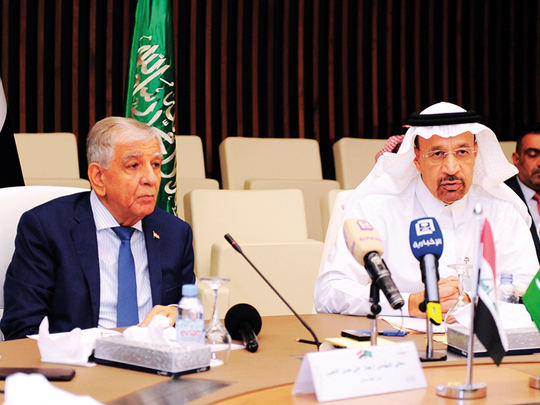
LONDON: Opec boosted estimates of demand for its crude this year and next amid stronger-than-expected fuel consumption and a weaker outlook for rival supply.
The Organisation of Petroleum Exporting Countries raised forecasts for the amount it needs to supply in 2017 and 2018 by about 200,000 barrels a day for each year, according to a monthly report from its secretariat in Vienna. Still, a rebound in Libyan production pushed the group’s output last month to the highest this year, undermining its plan to rebalance oversupplied world markets.
Oil prices have lost about 6 per cent in London this year as production cuts by Opec and Russia fail to clear a global glut. Oil climbed above $50 a barrel in New York after Opec boosted estimates of demand for its crude amid stronger-than-expected fuel consumption and a weaker outlook for rival supply.
The organisation increased projections for global oil demand in 2017 and 2018 by about 100,000 barrels a day for each year. Consumption proved stronger than expected in developed nations during the second quarter, it said.
Opec also lowered estimates for rival supply, by 50,000 barrels a day in 2017 and 90,000 a day in 2018, following weak output in the US and Canada last quarter.
The report indicated that Opec’s strategy to rebalance the market is having some success, with oil stockpiles in developed nations falling by 21.9 million barrels in June.
Libya, Nigeria
Still, at just over 3 billion barrels, this leaves them about 252 million above their five-year average. Opec has said its main objective is to reduce inventories to average levels.
The plan has been complicated by a rebound in supply from Libya and Nigeria, which were exempt from last year’s agreement to cut production while they tackled domestic unrest and supply outages.
Libyan output climbed by 154,300 barrels a day to about 1 million a day in July, according to external data sources compiled by Opec. Production from all 14 members reached 32.87 million a day.
Iraq, which has lagged behind other nations in delivering its promised cuts, showed some improvement in its adherence. The country’s output fell by 33,100 barrels a day to 4.468 million a day, still above its target.
While Opec uses external data — known as secondary sources — to monitor compliance with supply curbs, the report also includes production data submitted directly by member nations.
Saudi Arabia
Saudi Arabia told the organisation it pumped 10.01 million barrels a day in July, according to an Opec delegate who asked not to be identified. The number, initially missing from the report, represents a decline from 10.07 million the previous month.
Opec’s secondary sources showed the kingdom’s output at 10.067 million barrels a day in July, slightly above its target.
Despite the production increases, the report indicated that Opec can make more significant progress in depleting inventories during the second half of the year.
If the group’s output remains steady at 32.87 million barrels a day, it would shrink global stockpiles by about 68 million barrels.
Al Falih says talks with Iraq focused on oil pact, investment discussed
Saudi Arabia’s Energy Minister Khalid Al Falih said on Thursday that talks with his Iraqi counterpart stressed the need to strengthen commitment to a Opec-led agreement to reduce crude output. “The talks ... came out with an agreement in the vision between the two countries aimed at ensuring the stability of world oil markets and consolidating the gains made in the recent period,” Falih said in a statement.
The talks focused on “the need to intensify efforts to urge all parties to strengthen their commitment to the agreement to reduce production, to maintain the balance of global energy markets.” Al-Falih, who is also the minister of industry and mineral resources, said the economic relationship between the two countries “will witness more cooperation in the field of trade exchange ... and joint investments.”
Iraqi oil minister Jabar Luaibi met with Saudi Crown Prince Mohammad Bin Salman during his visit to Saudi Arabia, which started on Tuesday, the statement from the Energy Ministry said.












